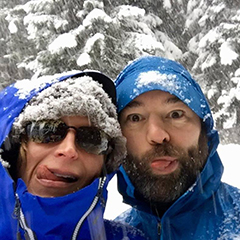Wilderness First Aid Class by @remotemedical
Posted on Sun 15 May 2011
This weekend Dawn and I took a Wilderness First Aid Class from Remote Medical International (web) (Facebook) (Twitter). The class is oriented towards “wilderness “ which is defined as anywhere more than 1 hour from medical care and the examples in the class were specifically focused on hiking and camping scenarios. We really wanted a medical class oriented towards sailors and especially those who plan go cruising, but currently this class does not seem to be available in Seattle. There have been classes off and one such as this, but right now they are not available. So any criticism I have doesn't really have anything to do with the class itself, but just that it wasn’t exactly what we wanted to begin with and so it misses in key areas.
The class is well run with a sound curriculum and our instructors Janet (EMT) and Phoebe (RN) were HIGHLY trained and knowledgeable. The class was comprised of 27 students was and covered the basics of First Aid from walking up on an injury with no prior knowledge, identifying life threatening issues, stabilizing the patient and making EVAC or “stay and play” decisions. It covered many kinds of injuries and illnesses that one might encounter in any scenario: fractures, wounds, allergies, abdominal injuries, spinal injuries, etc. and how we could treat these problems without a lot of magic gear.

All of this involved hands-on activity of actually splinting people, dressing pretend wounds, moving injured parties, etc. This part of the class it the best! One of the coolest things gear things was a SAM Splint which is a lightweight padded aluminum splinting tool that can be used in many ways, definitely a must-have for our medical kit.
If you have never had First Aid and if your main focus is on hiking and camping or other types of activity where an EVAC is possible even if it might take a day or more, this is a great class and I would highly recommend it.
For cruisers who plan to be so remote that EVAC isn’t a reasonable option, the class doesn’t go to that next level of when you should give antibiotics, or pain medicines, using SSB for medical assistance, etc. But again, that isn’t what this class is intended to cover, so I’m not knocking the class, I’m just mentioning that to set expectations. Also in Seattle, I believe this is probably the best current option so it's worth it if you need a refresher. We are still going to look for that ideal class and will probably refresh our CPR too at some point.
I also managed to work on some water maker wiring, nav station computer wiring and to get up early to go this class… Whew that was a long weekend! More on the other projects in posts yet to come.
